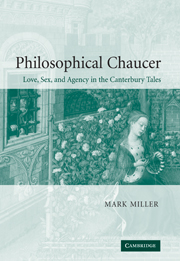Book contents
- Frontmatter
- Contents
- Acknowledgments
- Introduction: Chaucer and the problem of normativity
- Chapter 1 Naturalism and its discontents in the Miller's Tale
- Chapter 2 Normative longing in the Knight's Tale
- Chapter 3 Agency and dialectic in the Consolation of Philosophy
- Chapter 4 Sadomasochism and utopia in the Roman de la Rose
- Chapter 5 Suffering love in the Wife of Bath's Prologue and Tale
- Chapter 6 Love's promise: the Clerk's Tale and the scandal of the unconditional
- Notes
- Bibliography
- Index
Chapter 5 - Suffering love in the Wife of Bath's Prologue and Tale
Published online by Cambridge University Press: 22 September 2009
- Frontmatter
- Contents
- Acknowledgments
- Introduction: Chaucer and the problem of normativity
- Chapter 1 Naturalism and its discontents in the Miller's Tale
- Chapter 2 Normative longing in the Knight's Tale
- Chapter 3 Agency and dialectic in the Consolation of Philosophy
- Chapter 4 Sadomasochism and utopia in the Roman de la Rose
- Chapter 5 Suffering love in the Wife of Bath's Prologue and Tale
- Chapter 6 Love's promise: the Clerk's Tale and the scandal of the unconditional
- Notes
- Bibliography
- Index
Summary
In arguing for the convergence in Chaucer's poetry of his interest in philosophy and his interests in gender and sexuality, I have so far focused primarily on the ways Boethian philosophy can help us read the “courtly” or “romantic” scene of a masculine sexuality that is simultaneously objectifying and abject, and that takes pleasure both in the suffering of its object and in the suffering it inflicts on itself. In the previous chapter, however, I turned as well to the equally powerful interest Chaucer inherited from the Roman de la Rose and elsewhere in a utopian sociality that provides both a model for and a site of resistance to the small-scale intimacies available in erotic relations, friendship, and marriage. The final two chapters of this book will elaborate Chaucer's interest in the idea of a utopian intimacy in which “two become one,” in the context of discussions that move beyond the relatively narrow sphere of courtly male desire to examine how ideologies of gender and sexuality function in the formation of medieval women as subjects and agents, and how those ideologies affect the dynamics of the intimate couple. My discussion will focus on the two texts in which Chaucer pursued his interests in these topics most thoroughly and powerfully, the Wife of Bath's Prologue and Tale and the Clerk's Tale.
- Type
- Chapter
- Information
- Philosophical ChaucerLove, Sex, and Agency in the Canterbury Tales, pp. 191 - 215Publisher: Cambridge University PressPrint publication year: 2005

